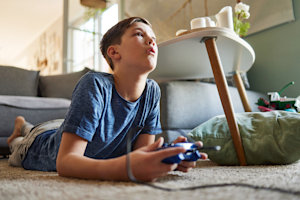
Digital wellness
Still going strong? How to use digital tools to maintain your resolution momentum.
Practical tips for using digital tools mindfully to keep your resolutions alive.
Read article
Krista Naugler, CCLS
Upopolis Island National Program Manager

Dealing with the death of a loved one is an experience shared by individuals of all ages. The older you are, the more likely it is that you’ll have friends or peers in your social circle who have also experienced loss, but for youth, this may not be the case. As a result, parents and caregivers may look to the Internet to help connect their grieving child(ren) with peers who are also navigating grief, and/or to source age-appropriate resources and support. If you’re looking to the Internet for information and resources to help your child deal with grief and the loss of the loved one, consider these tips:
The internet is full of helpful information, but it can also be full of misinformation. It’s important to remember to check your sources, look at websites and communities that offer credible and vetted information to ensure you’re sharing accurate and age appropriate content with your child.
Your time is valuable, and your family's safety is key, so you want to be sure to connect with the appropriate and best support and resources available. Ask a healthcare professional or counsellor about resources that are available online for the youth they serve. Trusting recommendations from an expert will help give you peace of mind about how you are supporting your child and their participation in an online community.
Research shows that youth engage more with peers online with whom they have things in common e.g. they participate in the same program, have experienced the same type of loss , share a common illness, or they are the same age. If your child is seeking an online community to share their grief and get support, be sure to confirm if the online community has members that your child will relate to.
Connecting your child in an online community that is monitored will help ensure that healthy relationships are being established and that interactions and posts between users meet the terms of the community. Show your child how to report any inappropriate content or behaviour, and you can also explore and adjust the privacy settings together to ensure their privacy is protected.
Peer support is huge for youth, but you may want to consider what other benefits the community has to offer. Does the community share resources that foster the development of positive coping skills and support your child in processing their feelings? Does the community provide access to experts and/or programming developed by professionals? Does the community meet the needs of your child?
Designed by child life specialists with expert knowledge of the unique needs and considerations of youth and youth safety in mind, Upopolis and Upopolis Island are safe and positive online communities for those living with illness and navigating challenging life events. Geared toward youth ages 10-18 years, a referral is required to join the community. The community is monitored by a team of child life specialists who vet all referrals and also develop all the programming with the specific needs of youth in mind. Explore Upopolis now.

Practical tips for using digital tools mindfully to keep your resolutions alive.
Read article
Award-winning digital literacy resources now available to Canadian educators.
Read article
Learn how gaming and gambling features blur for kids.
Read article